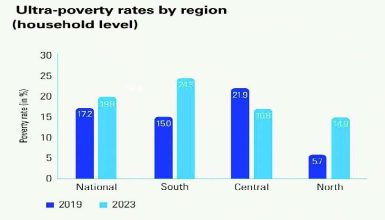Consumer loans rise, businesses struggle
Consumer loans continue taking a huge chunk of private sector credit, occupying about 38.2 percent of total loans to the private sector currently at K1.2 trillion, published Reserve Bank of Malawi (RBM) data shows.
However, this is happening at a time 95 percent of firms in the country are struggling to access financing, according to World Bank findings.

This means that up to K458.4 billion has been loaned to consumers for consumption.
However, productive sectors of agriculture, forestry, fishing and hunting (18.2 percent), wholesale and retail trade (17.1 percent) and manufacturing (12.8 percent) continue to trail behind.
In an interview, Consumers Association of Malawi executive director John Kapito said the Malawi economy is a consumptive as majority of the economic activity is mostly in trading.
He said: “This is as a result of the failure by authorities to establish financial institutions that can develop those long-term investments or sectors whose growth requires time and supported with relatively cheap financing to help them grow.
“We witness huge borrowing on consumer loans that are not long-term and not associated with production. The finance market in Malawi is dangerous for long-term investors as the cost of the money and borrowing is just too unrealistic.”
As at October 2023, RBM data shows that the annual growth of private sector credit decelerated to 19.1 percent from 20.4 percent the previous month, and was lower than the 23.7 percent registered in the corresponding month in 2022.
However, on a monthly basis, the stock of private sector credit increased by K18.2 billion (1.5 percent) to K1.2 trillion in October 2023. Commercial and industrial loans, mortgages and individual household loans increased by K15.2 billion, K3.9 billion and K1.9 billion in the review month, respectively.
This was offset by a decrease in foreign currency denominated loans amounting to K3 billion in the review month.
In terms of economic sectors, expansions in private sector credit were recorded in manufacturing (K17.7 billion); wholesale and retail trade (K2.1 billion); restaurants and hotels (K1.1 billion); financial services (K1.1 billion); transport, storage and communications (K373.7 million); and Mining and quarrying (K40.5 million).
However, in its Malawi Economic Memorandum published recently, the World Bank said 95 percent of firms express difficulties in accessing financing, citing high interest rates and repayment risks as their main concerns.
The bank said with limited access to finance, firms are unable to withstand shocks and grow.
Said the bank in the report: “Paradoxically, while the financial sector has remained stable and profitable amid recent crises, outperforming regional comparators, this success is largely attributed to extensive lending to the government, crowding out credit available to the private sector.
“Due to low-risk appetite, financial institutions provide limited supply of credit to the private sector and charge high rates to private sector borrowers. Key factors constraining lending to smaller and informal firms include lack of collateral and proper credit referencing, identity card challenges and the informality of most firm.”





